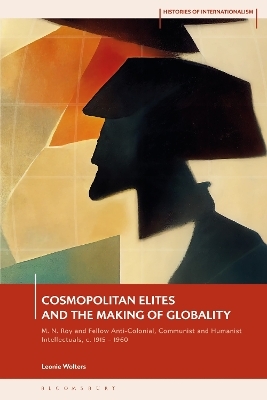
Cosmopolitan Elites and the Making of Globality
M. N. Roy and Fellow Anti-Colonial, Communist and Humanist Intellectuals, c. 1915 – 1960
Seiten
2025
Bloomsbury Academic (Verlag)
978-1-350-37318-1 (ISBN)
Bloomsbury Academic (Verlag)
978-1-350-37318-1 (ISBN)
- Noch nicht erschienen (ca. August 2025)
- Versandkostenfrei
- Auch auf Rechnung
- Artikel merken
As ideologies such as communism, fascism and various nationalisms vied for global domination during the first half of the 20th century, this book shows how a specific group of individuals - a cosmopolitan elite - became representatives of those ideologies the world over.
Centering on the Indian intellectual M.N Roy, Cosmopolitan Elites and the Making of Globality situates his life within various social circles that covered several ideological realms and continents. An example of an individual who represented ideologies such as anticolonial nationalism, communism and humanism, Roy is identified as unusual but by no means singular in this capacity, and shows how other elites were similarly able to represent ideologies that sought to make the world anew.
This book explores how Roy and his peers and competitors became a political elite as they cultivated a cosmopolitan reputation that meant they were taken seriously even when speaking of regions outside of their own. By considering the social and performative practices that turned them into credible, global, cosmopolitans, Wolters uncovers the exclusive basis on which the universal claims of world-changing ideologies were made.
Centering on the Indian intellectual M.N Roy, Cosmopolitan Elites and the Making of Globality situates his life within various social circles that covered several ideological realms and continents. An example of an individual who represented ideologies such as anticolonial nationalism, communism and humanism, Roy is identified as unusual but by no means singular in this capacity, and shows how other elites were similarly able to represent ideologies that sought to make the world anew.
This book explores how Roy and his peers and competitors became a political elite as they cultivated a cosmopolitan reputation that meant they were taken seriously even when speaking of regions outside of their own. By considering the social and performative practices that turned them into credible, global, cosmopolitans, Wolters uncovers the exclusive basis on which the universal claims of world-changing ideologies were made.
Leonie Wolters is a postdoc researcher at the Leibniz Centre for Contemporary History in Potsdam, Germany. Having studied in Utrecht, Edinburgh and Dar es Salaam she has also worked in journalism and created several documentaries for Dutch radio.
Introduction: Giving a Face to the World; M. N. Roy in the Role of a Lifetime
Chapter 1: Clubs for Outsiders; Making a Vagrant Elite
Chapter 2: Worldly Bodies; Practices of Mobility across Ideological Divides
Chapter 3: Bengali Actors on World Stages
Chapter 4: Human Resources: Exiles, Professional Revolutionaries and
Development Experts
Chapter 5: A Flat Earth: Perspectives from Nowhere
Conclusion: The World Incorporated
Bibliography
| Erscheint lt. Verlag | 21.8.2025 |
|---|---|
| Reihe/Serie | Histories of Internationalism |
| Zusatzinfo | 10 bw illus |
| Verlagsort | London |
| Sprache | englisch |
| Maße | 156 x 234 mm |
| Themenwelt | Geschichte ► Allgemeine Geschichte ► Neuzeit (bis 1918) |
| Sozialwissenschaften ► Politik / Verwaltung ► Politische Systeme | |
| Sozialwissenschaften ► Politik / Verwaltung ► Politische Theorie | |
| ISBN-10 | 1-350-37318-4 / 1350373184 |
| ISBN-13 | 978-1-350-37318-1 / 9781350373181 |
| Zustand | Neuware |
| Haben Sie eine Frage zum Produkt? |
Mehr entdecken
aus dem Bereich
aus dem Bereich
Europa 1848/49 und der Kampf für eine neue Welt
Buch | Hardcover (2023)
DVA (Verlag)
CHF 67,20
Giordano Bruno - ein ketzerisches Leben
Buch | Hardcover (2024)
C.H.Beck (Verlag)
CHF 41,85


